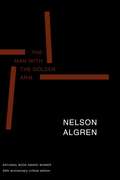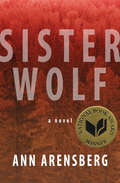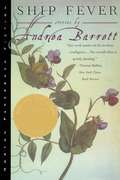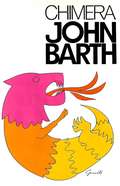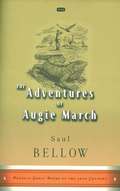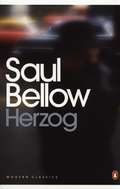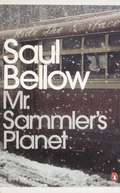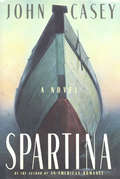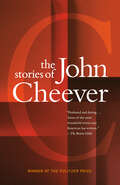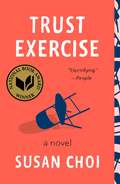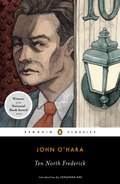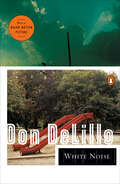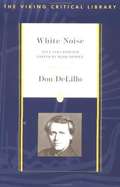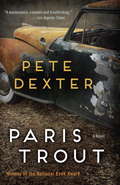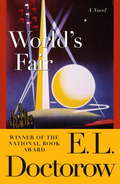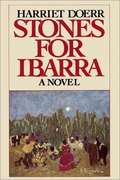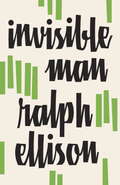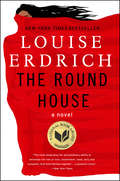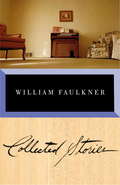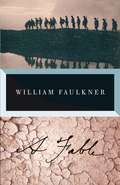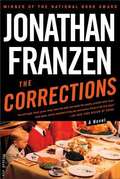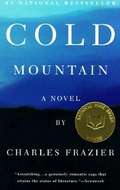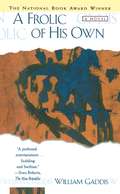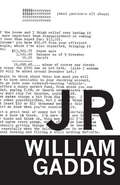Special Collections
National Book Award Winners - Fiction
- Table View
- List View
The Man with the Golden Arm (50th Anniversary Edition)
by Nelson AlgrenThe Man with the Golden Arm is Nelson Algren's most powerful and enduring work. On the 50th anniversary of its publication in November 1949, for which Algren was honored with the first National Book Award (which he received from none other than Eleanor Roosevelt at a ceremony in March 1950), Seven Stories is proud to release the first critical edition of an Algren work.
A novel of rare genius, The Man with the Golden Arm describes the dissolution of a card-dealing WWII veteran named Frankie Machine, caught in the act of slowly cutting his own heart into wafer-thin slices. For Frankie, a murder committed may be the least of his problems. A literary tour de force, here is a novel unlike any other, one in which drug addiction, poverty, and human failure somehow suggest a defense of human dignity and a reason for hope.
Special contributions by Russell Banks, Bettina Drew, James R. Giles, Carlo Rotella, William Savage, Lee Stringer, Studs Terkel, Kurt Vonnegut, and others.
Winner of the first National Book Award
Sister Wolf
by Ann ArensbergOn a June night in the Berkshire Hills of Massachusetts, Marit Deym prowls her land, anxiously awaiting the arrival of the van from the Dangerfield Zoo. When it finally comes--hours late--five wolves leap out onto the sprawling wildlife refuge Marit has created. And then one night, the wolves bring a stranger to her door.A poetry instructor at a school for the blind, Gabriel Frankman lives in self-imposed exile after the death of the girl he loved. He visits her grave every weekend. He carries sunflower seeds in his backpack and his friends are the birds. Meeting the girl who keeps wolves will transform Gabriel's life in ways he could never imagine.Haunting and lyrical, shot through with grace notes of passion and sorrow, Sister Wolf is about the power of human beings--like that of their animal brethren--to survive and endure.
Winner of the National Book Award for Best First Novel
Ship Fever
by Andrea Barrett1996 National Book Award Winner for Fiction.
The elegant short fictions gathered hereabout the love of science and the science of love are often set against the backdrop of the nineteenth century. Interweaving historical and fictional characters, they encompass both past and present as they negotiate the complex territory of ambition, failure, achievement, and shattered dreams. In "Ship Fever," the title novella, a young Canadian doctor finds himself at the center of one of history's most tragic epidemics. In "The English Pupil," Linnaeus, in old age, watches as the world he organized within his head slowly drifts beyond his reach. And in "The Littoral Zone," two marine biologists wonder whether their life-altering affair finally was worth it. In the tradition of Alice Munro and William Trevor, these exquisitely rendered fictions encompass whole lives in a brief space. As they move between interior and exterior journeys, "science is transformed from hard and known fact into malleable, strange and thrilling fictional material" (Boston Globe).
Chimera
by John BarthChimera is a 310 page mythological fantasy novel written by the distinguished novelist and Humanities professor John Barth and first published in 1972. Random House provides the following illustration and analysis of the work's artistic tone and value:
"At this point I interrupted my sister as usual to say, 'You have a way with words, Scheherazade. This is the thousandth night I've sat at the foot of your bed while you and the King made love and you told him stories, and the one in progress holds me like a genie's gaze.'"
The speaker here is Dunyazade, kid sister of Scheherazade of The Thousand and One Nights, who has her own way with words. There is also Perseus, the demigod who slew the Gorgon Medusa, and yet finds himself at forty "sealeveled, parched and plucked, every grain in my molted sandals raising blisters, and beleaguered by the serpents of my past." And Bellerophon, the hero who tames the winged horse Pegasus only to discover, "My life's a failure. I'm not a mythic hero. I never will be." Like the Chimera of myth, which had a lion's head, a goat's body, and a serpent's tail, they are all joined into a single, dazzling whole that is, in a sense, the culmination of all of John Barth's work thus far, transforming myth into daily reality and vice versa.
"To the objection that classical mythology, like the Bible, is no longer a staple of the average reader's education and that, consequently, the old agonies of Oedipus or Antigone are without effect on contemporary sensibility, I reply, hum, I forget what, something about comedy and selfexplanatory context."
The reader needs no previous acquaintance with the characters to be caught up in this hilariously exuberant exploration of the nature of the hero, the multitudinous relationships between men and women, and the mortal search for immortality, which, it is persuasively suggested, may lie not in deeds but in words.
Winner of the National Book Award
The Adventures of Augie March
by Saul BellowOriginally published in 1953, Saul Bellow's modern picaresque tale grandly illustrates twentieth-century man's restless pursuit of an elusive meaning.
Augie March, a young man growing up in Chicago during the Great Depression, doesn't understand success on other people's terms.
Fleeing to Mexico in search of something to fill his restless soul and soothe his hunger for adventure, Augie latches on to a wild succession of occupations until his journey brings him full circle.
Yet beneath Augie's carefree nature lies a reflective person with a strong sense of responsibility to both himself and others, who in the end achieves a success of his own making.
A modern-day Columbus, Augie March is a man searching not for land but for self and soul and, ultimately, for his place in the world.
Winner of the National Book Award
[This text is listed as an example that meets Common Core Standards in English language arts in grades 11-12 at http://www.corestandards.org.]
Herzog
by Saul BellowWinner of the National Book Award for Fiction, Herzog is the story of Moses Herzog, great sufferer, joker and moaner, cuckold, charmer, a man of our time.
Mr. Sammler's Planet
by Saul BellowMr. Artur Sammler, Holocaust survivor, intellectual, and occasional lecturer at Columbia University in 1960s New York City, is a “registrar of madness,” a refined and civilized being caught among people crazy with the promises of the future (moon landings, endless possibilities). His Cyclopean gaze reflects on the degradations of city life while looking deep into the sufferings of the human soul. “Sorry for all and sore at heart,” he observes how greater luxury and leisure have only led to more human suffering. To Mr. Sammler—who by the end of this ferociously unsentimental novel has found the compassionate consciousness necessary to bridge the gap between himself and his fellow beings—a good life is one in which a person does what is “required of him.” To know and to meet the “terms of the contract” was as true a life as one could live. At its heart, this novel is quintessential Bellow: moral, urbane, sublimely humane.
Winner of the National Book Award
Spartina
by John CaseyA classic tale of a man, a boat, and a storm, Spartina is the lyrical and compassionate story of Dick Pierce, a commercial fisherman along the shores of Rhode Island's Narragansett Bay. A kind, sensitive, family man, he is also prone to irascible outbursts against the people he must work for, now that he can no longer make his living from the sea.
Pierce's one great passion, a fifty-foot fishing boat called Spartina, lies unfinished in his back yard. Determined to get the funds he needs to buy her engine, he finds himself taking a foolish, dangerous risk. But his real test comes when he must weather a storm at sea in order to keep his dream alive. Moving and poetic, Spartina is a masterly story of one man's ongoing struggle to find his place in the world.
Winner of the 1989 National Book Award
The Stories of John Cheever
by John CheeverWhen The Stories of John Cheever was originally published, it became an immediate national bestseller and won the Pulitzer Prize. In the years since, it has become a classic. Vintage Books is proud to reintroduce this magnificent collection.
Here are sixty-one stories that chronicle the lives of what has been called "the greatest generation." From the early wonder and disillusionment of city life in "The Enormous Radio" to the surprising discoveries and common mysteries of suburbia in "The Housebreaker of Shady Hill" and "The Swimmer," Cheever tells us everything we need to know about "the pain and sweetness of life."
Winner of the Pulitzer Prize
Winner of the National Book Award
The Wapshot Chronicle
by John CheeverThis National Book Award winner depicts the lives of the Wapshot family members, residents of the fishing village St. Botolphs, Massachusetts.
Trust Exercise
by Susan ChoiIn an American suburb in the early 1980s, students at a highly competitive performing arts high school struggle and thrive in a rarified bubble, ambitiously pursuing music, movement, Shakespeare, and, particularly, their acting classes.
When within this striving “Brotherhood of the Arts,” two freshmen, David and Sarah, fall headlong into love, their passion does not go unnoticed—or untoyed with—by anyone, especially not by their charismatic acting teacher, Mr. Kingsley.
The outside world of family life and economic status, of academic pressure and of their future adult lives, fails to penetrate this school’s walls—until it does, in a shocking spiral of events that catapults the action forward in time and flips the premise upside-down.
What the reader believes to have happened to David and Sarah and their friends is not entirely true—though it’s not false, either. It takes until the book’s stunning coda for the final piece of the puzzle to fall into place—revealing truths that will resonate long after the final sentence.
As captivating and tender as it is surprising, Susan Choi's Trust Exercise will incite heated conversations about fiction and truth, and about friendships and loyalties, and will leave readers with wiser understandings of the true capacities of adolescents and of the powers and responsibilities of adults.
Ten North Frederick
by Jonathan Dee and John O'HaraThe National Book Award-winning novel by the writer whom Fran Lebowitz called "the real F. Scott Fitzgerald"Joe Chapin led a storybook life.
A successful small-town lawyer with a beautiful wife, two over-achieving children, and aspirations to be president, he seemed to have it all. But as his daughter looks back on his life, a different man emerges: one in conflict with his ambitious and shrewish wife, terrified that the misdeeds of his children will dash his political dreams, and in love with a model half his age. With black wit and penetrating insight, Ten North Frederick stands with Richard Yates' Revolutionary Road, Evan S. Connell's Mr. Bridge and Mrs. Bridge, the stories of John Cheever, and Mad Men as a brilliant portrait of the personal and political hypocrisy of mid-century America.
White Noise
by Don DelilloJack Gladney is the creator and chairman of Hitler studies at the College-on-the-Hill. This is the story of his absurd life; a life that is going well enough, until a chemical spill from a rail car releases an 'Airborne Toxic Event' and Jack is forced to confront his biggest fear - his own mortality.
White Noise is an effortless combination of social satire and metaphysical dilemma in which DeLillo exposes our rampant consumerism, media saturation and novelty intellectualism. It captures the particular strangeness of life lived when the fear of death cannot be denied, repressed or obscured and ponders the role of the family in a time when the very meaning of our existence is under threat.
Winner of the National Book Award
White Noise
by Don Delillo and Mark OsteenWhite Noise is the story of Jack and Babette and their children from their six or so various marriages. They live in a college town where Jack is Professor of Hitler Studies (and conceals the fact that he does not speak a word of German), and Babette teaches posture and volunteers by reading from the tabloids to a group of elderly shut-ins. They are happy enough until a deadly toxic accident and Babette's addiction to an experimental drug make Jake question everything. White Noise is considered a postmodern classic and its unfolding of themes of consumerism, family and divorce, and technology as a deadly threat have attracted the attention of literary scholars since its publication.
This Viking Critical Library edition, prepared by scholar Mark Osteen, is the only edition of White Noise that contains the entire text along with an extensive critical apparatus, including a critical introduction, selected essays on the author, the work and its themes, reviews, a chronology of DeLillo's life and work, a list of discussion topics, and a selected bibliography.
Winner of the National Book Award
Paris Trout
by Pete DexterPete Dexter’s tour de force tells the mesmerizing story of a shocking crime that shatters lives and exposes the hypocrisies of a small Southern town.
The time and place: Cotton Point, Georgia, just after World War II. The event: the murder of a fourteen-year-old black girl by a respected white citizen named Paris Trout, who feels he’s done absolutely nothing wrong. As a trial looms, the crime eats away at the social fabric of Cotton Point, through its facade of manners and civility. Trout’s indifference haunts his defense lawyer; his festering paranoia warps his timid, quiet wife; and Trout himself moves closer to madness as he becomes obsessed with his cause—and his vendettas.
Winner of the National Book Award
World's Fair
by E. L. DoctorowThe astonishing novel of a young boy's life in the New York City of the 1930s, a stunning recreation of the sights, sounds, aromas and emotions of a time when the streets were safe, families stuck together through thick and thin, and all the promises of a generation culminate in a single great World's Fair...
Winner of the National Book Award
Stones for Ibarra
by Harriet DoerrTwo Americans, Richard and Sara Everton, are the only foreigners in Ibarra. They live among people who both respect and misunderstand them, and gradually, the villagers--at first enigmas to the Evertons--come to teach them much about life and the relentless tide of fate.
Winner of the National Book Award
Invisible Man
by Ralph EllisonInvisible Man is a milestone in American literature, a book that has continued to engage readers since its appearance in 1952.
The nameless narrator of the novel describes growing up in a black community in the South, attending a Negro college from which he is expelled, moving to New York and becoming the chief spokesman of the Harlem branch of "the Brotherhood", and retreating amid violence and confusion to the basement lair of the Invisible Man he imagines himself to be.
The book is a passionate and witty tour de force of style, strongly influenced by T.S. Eliot's The Waste Land, Joyce, and Dostoevsky.
Winner of the National Book Award
The Round House
by Louise ErdrichOne Sunday in the spring of 1988, a woman living on a reservation in North Dakota is attacked. The details of the crime are slow to surface as Geraldine Coutts is traumatized and reluctant to relive or reveal what happened, either to the police or to her husband, Bazil, and thirteen-year-old son, Joe. In one day, Joe's life is irrevocably transformed. He tries to heal his mother, but she will not leave her bed and slips into an abyss of solitude. Increasingly alone, Joe finds himself thrust prematurely into an adult world for which he is ill prepared. While his father, who is a tribal judge, endeavors to wrest justice from a situation that defies his efforts, Joe becomes frustrated with the official investigation and sets out with his trusted friends, Cappy, Zack, and Angus, to get some answers of his own. Their quest takes them first to the Round House, a sacred space and place of worship for the Ojibwe. And this is only the beginning. Written with undeniable urgency, and illuminating the harsh realities of contemporary life in a community where Ojibwe and white live uneasily together, The Round House is a brilliant and entertaining novel, a masterpiece of literary fiction. Louise Erdrich embraces tragedy, the comic, a spirit world very much present in the lives of her all-too-human characters, and a tale of injustice that is, unfortunately, an authentic reflection of what happens in our own world today.
Winner of the National Book Award
Collected Stories
by William Faulkner"I'm a failed poet. Maybe every novelist wants to write poetry first, finds he can't and then tries the short story which is the most demanding form after poetry. And failing that, only then does he take up novel writing." --William Faulkner
Forty-two stories make up this magisterial collection by the writer who stands at the pinnacle of modern American fiction. Compressing an epic expanse of vision into hard and wounding narratives, Faulkner's stories evoke the intimate textures of place, the deep strata of history and legend, and all the fear, brutality, and tenderness of the human condition. These tales are set not only in Yoknapatawpha County, but in Beverly Hills and in France during World War I. They are populated by such characters as the Faulknerian archetypes Flem Snopes and Quentin Compson, as well as by ordinary men and women who emerge so sharply and indelibly in these pages that they dwarf the protagonists of most novels.
Winner of the National Book Award
A Fable
by William FaulknerAn allegorical story of World War I, set in the trenches in France and dealing ostensibly with a mutiny in a French regiment, it was originally considered a sharp departure for Faulkner. Recently it has come to be recognized as one of his major works and an essential part of the Faulkner oeuvre.
This novel won both the Pulitzer Prize and the National Book Award in 1955.
The Corrections
by Jonathan FranzenAfter almost fifty years as a wife and mother, Enid Lambert is ready to have some fun. Unfortunately, her husband, Alfred, is losing his sanity to Parkinson's disease, and their children have long since flown the family nest to the catastrophes of their own lives. The oldest, Gary, a once-stable portfolio manager and family man, is trying to convince his wife and himself, despite clear signs to the contrary, that he is not clinically depressed. The middle child, Chip, has lost his seemingly secure academic job and is failing spectacularly at his new line of work. And Denise, the youngest, has escaped a disastrous marriage only to pour her youth and beauty down the drain of an affair with a married man-or so her mother fears. Desperate for some pleasure to look forward to, Enid has set her heart on an elusive goal: bringing her family together for one last Christmas at home.
Winner of the 2001 National Book Award for Fiction
Cold Mountain
by Charles FrazierOne of the most acclaimed novels in recent memory, Charles Frazier's Cold Mountain is a masterpiece that is at once an enthralling adventure, a stirring love story, and a luminous evocation of a vanished American in all its savagery, solitude, and splendor.
Sorely wounded and fatally disillusioned in the fighting at Petersburg, Inman, a Confederate soldier, decides to walk back to his home in the Blue Ridge Mountains and to Ada, the woman he loved there years before. His trek across the disintegrating South brings him into intimate and sometimes lethal converse with slaves and marauders, bounty hunters and witches, both helpful and malign. At the same time, Ada is trying to revive her father's derelict farm and learn to survive in a world where the old certainties have been swept away. As it interweaves their stories, Cold Mountain asserts itself as an authentic American Odyssey--hugely powerful, majestically lovely, and keenly moving.
Winner of the National Book Award
A Frolic of His Own
by William GaddisA dazzling fourth novel by the author of The Recognitions, Carpenter’s Gothic, and JR uses his considerable powers of observation and satirical sensibilities to take on the American legal system.
Winner of the 1994 National Book Award.
J R
by Rick Moody and William GaddisJ R is a biting satire about the many ways in which capitalism twists the American spirit into something dangerous, yet pervasive and unassailable. At the center of the novel is a hilarious eleven year old-J R-who with boyish enthusiasm turns a few basic lessons in capitalist principles, coupled with a young boy's lack of conscience, into a massive and exploitative paper empire. The result is one of the funniest and most disturbing stories ever told about the corruption of the American dream.
Winner of the 1976 National Book Award
